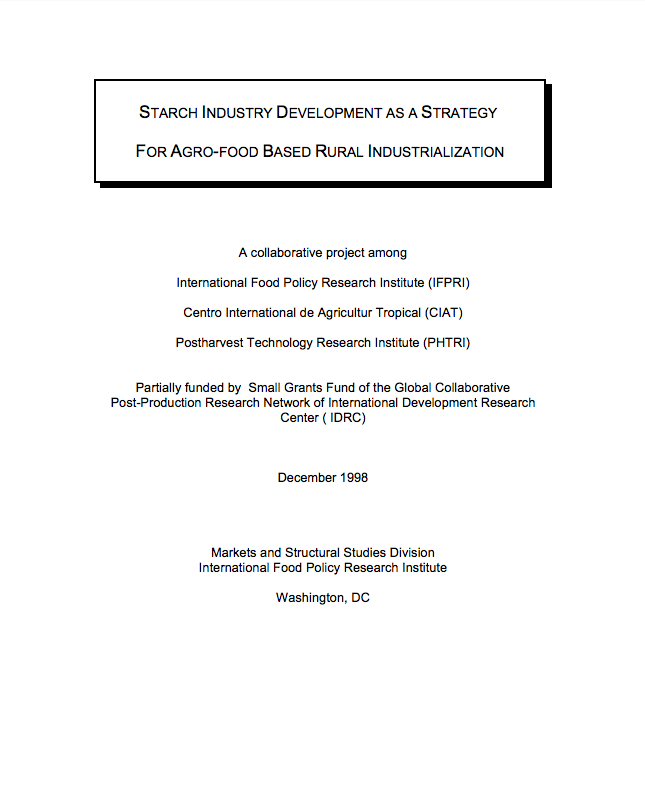Focal point
Location
About IFPRI
The International Food Policy Research Institute (IFPRI) provides research-based policy solutions to sustainably reduce poverty and end hunger and malnutrition in developing countries. Established in 1975, IFPRI currently has more than 500 employees working in over 50 countries. It is a research center of theCGIAR Consortium, a worldwide partnership engaged in agricultural research for development.
Vision and Mission
IFPRI’s vision is a world free of hunger and malnutrition. Its mission is to provide research-based policy solutions that sustainably reduce poverty and end hunger and malnutrition.
What We Do
Research at IFPRI focuses on six strategic areas:
- Ensuring Sustainable Food Production: IFPRI’s research analyzes options for policies, institutions, innovations, and technologies that can advance sustainable food production in a context of resource scarcity, threats to biodiversity, and climate change. READ MORE
- Promoting Healthy Food Systems: IFPRI examines how to improve diet quality and nutrition for the poor, focusing particularly on women and children, and works to create synergies among the three vital components of the food system: agriculture, health, and nutrition. READ MORE
- Improving Markets and Trade: IFPRI’s research focuses on strengthening markets and correcting market failures to enhance the benefits from market participation for small-scale farmers. READ MORE
- Transforming Agriculture: The aim of IFPRI’s research in this area is to improve development strategies to ensure broad-based rural growth and to accelerate the transformation from low-income, rural, agriculture-based economies to high-income, more urbanized, and industrial service-based ones. READ MORE
- Building Resilience: IFPRI’s research explores the causes and impacts of environmental, political, and economic shocks that can affect food security, nutrition, health, and well-being and evaluates interventions designed to enhance resilience at various levels. READ MORE
- Strengthening Institutions and Governance: IFPRI’s research on institutions centers on collective action in management of natural resources and farmer organizations. Its governance-focused research examines the political economy of agricultural policymaking, the degree of state capacity and political will required for achieving economic transformation, and the impacts of different governance arrangements.
Research on gender cuts across all six areas, because understanding the relationships between women and men can illuminate the pathway to sustainable and inclusive economic development.
IFPRI also leads two CGIAR Research Programs (CRPs): Policies, Institutions, and Markets (PIM) andAgriculture for Nutrition and Health (A4NH).
Beyond research, IFPRI’s work includes partnerships, communications, and capacity strengthening. The Institute collaborates with development implementers, public institutions, the private sector, farmers’ organizations, and other partners around the world.
Resources
Displaying 1401 - 1405 of 1521Land tenure and management of trees
Customary land areas in Western Ghana have been evolving towards individualized ownership. Inherited and temporarily allocated family lands are being transferred to wives and children as inter-vivos gifts, to be planted with cocoa. Giving gifts is a way to circumvent the traditional Akan matrilineal land inheritance system in which land is transferred from a deceased man to his matrilineal relatives but not to his wife and children.
An economic analysis of the effects of production : risk on the use and management of common-pool rangelands
Discussion paper
Starch industry development as a strategy for agro-food based rural industrialization
To promote development, there is increasing need for activities and policies which generate and diversify income in rural areas. The starch industry in Viet Nam provides a good example of rural industrialization whereby low-value agricultural commodities such as cassava and canna are processed into high-value commodities such as starch to be used in a variety of food and non-food industries. Though this sector is relatively small, it has a high potential in terms of demand growth, poverty reduction, and income diversification in rural areas, particularly the less favored ones.
Policy for plenty
This paper suggests practical methods for assessing policy research programs, both ex post and ex ante. Measuring the benefits of policy research is difficult: the path of causation between research and policy change is nearly always uncertain; multiple factors influence any particular policy change; policies are diverse in nature as are their intended and actual effects; and some effects of policy research are not priced in the market. Many of the benefits of changes in policy stem from the reduced cost of welfare-improving institutional change.
Endogeneity of schooling in the wage function
This paper evaluates the effect (in terms of private returns) of investment in education on wages in the rural Philippines. Statistical endogeneity of education in the wage function may result from (1) unobserved determinants of education that also influence wages and/or (2) measurement error. Panel data are used that provide relevant instruments, particularly distance to schools and measures of household resources, at the time of schooling, to endogenize investments in education while estimating wage functions.




